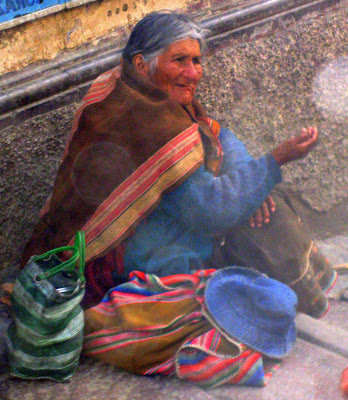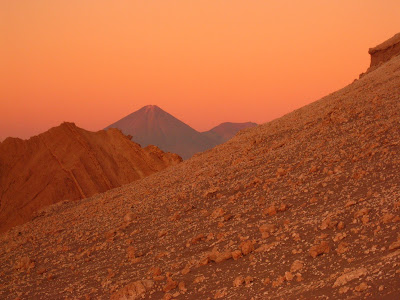
La Paz is the highest capital city on Earth, at 3660 meters it is certainly up there. We got to about 4000 meters at least once on the way here and I was starting to feel out of breath from just from sitting on the bus. However, having had altitude sickness a number of times now, I am starting to work out how to handle it. My strategy is to not eat much and get plenty of rest on the first day. That is pretty easy as I don't mind the occasional siesta and have had almost no appetite since I have been here. Kim seems to have some superhuman resistance to it, but that's the way it goes apparently, some get it, some don't.

So the first day was a bit of a write-off for me but on the second day I felt fine even walking up hills. We went on a tour around the city and got to find out a bit about the history. It seems that Bolivia is suffering the death of 1000 cuts, once a much larger country it has lost a series of wars with its neighboring countries, and with that lost its access to the sea and much of its natural resources. People here are pretty poor, but there government still provides free education and free medical care for children and people over 65. Bolivia has the highest birth rate in South America with an average of five children per mother. A large percentage of its population are under 25. The retirement age is 65, but life expectancy for men is 60 and for women its 63.
Hardly anyone speaks English here, so Spanish is pretty much essential for most things. People find our accents a little hard to understand. For example, even though the word 'menu' is the same in both English and Spanish, you just can't say 'men you' like you do at home or in other parts of South America. Eventually one of the people I was speaking with got what I was saying and said 'men oo' (like oo in cool) and it was OK. Amazing how much a subtle pronunciation difference like that can make.
Anyway, given our interests in all things culinary, we went out for a curry somewhere in the city. That was OK, but nothing like curries that I am used to. More like an Indian-Chinese fusion dish, it was even served up with chopsticks. Anyway, we had 2 courses and 2 beers each and that cost $120 Bolivian, which is about $20 Australian. After that we went and bought a heap of silver stuff, some for Kim's upcoming 40th birthday, and a silver spoon for work. There are some big silver mines near here at Potosi.

After that we were walking down the street and we saw this European (Polish) couple struggling up the hill. The bloke appeared to be half carrying and half dragging his girlfriend and then he sat her down near a wall. We went over and offered some help. I ended up having to help carry the girl up to her room, further up the hill. Apparently, according to the bloke she just has funny turns and loses her sight and her balance. I must say I've never heard of that before. They didn't appear to be affected by alcohol or drugs. She was crying quietly and I was struggling a bit myself with a residual leg injury and still some high altitude breathlessness. Anyway, my good deed for the day I suppose. The bloke was really grateful that I helped them.
Then the next day we caught a bus out of Bolivia on our way to Peru. There are hundreds of buses in Bolivia, and maybe 10-20 different bus companies operating here. When we got on the bus, someone had taken our seats, that in itself isn't that unusual. I thought I recognised the people that had our seats, it turns out it was the same Polish couple that we had helped the night before. I asked them if we had helped them last night to confirm what I thought. It was bizarre enough them being on the same bus, without adding to the coincidence of them somehow being allocated the same seats as us.
Here is an interactive panorama from the top of La Paz. The image will rotate by itself, but if you click on it and hold the mouse button down you can control where it goes. Also notice the + and - buttons on the bottom left hand side if you want to zoom in or out. Try tilting the image up then zooming in and around the skyline. Good luck!!
To view the slideshow please click here.









 The next day we headed up to the ski fields. The resort that we stayed at was El Colorado, about 3300 meters up in the Andes. I had a bit of breathlessness and headaches from the altitude, but nowhere near as bad as I had last time I was in Cusco, Peru, despite the altitude being almost the same. The weather was great, fine sunny days, it was almost hot. People were out skiing in T shirts. We took some skiing lessons and both had our own instructors. I had done some skiing before, when I was 17, and it must be like riding a bike because I could ski as well or if not better than I had ever been able to. Kim was a novice and I was maybe 1 step ahead of her. Kim had to learn to stop, and I had to learn to turn. We both mastered these steps and in my case maybe too well. On my last trip down the big hill I thought that being able to go fast would be my next challenge. I was going pretty well too and maybe 100 meters from the bottom when I got the speed wobbles and took a bit of a tumble. I felt the tendon in my leg give a bit of a snap ... not good. However, I managed to make it down the hill and ski back to the apartment. Kim was a great nurse and put some snow in a supermarket bag and put it on my leg. I'm feeling much better now though, but walk much more slowly than before. I guess it pays to be a scaredy-cat sometimes :-).
The next day we headed up to the ski fields. The resort that we stayed at was El Colorado, about 3300 meters up in the Andes. I had a bit of breathlessness and headaches from the altitude, but nowhere near as bad as I had last time I was in Cusco, Peru, despite the altitude being almost the same. The weather was great, fine sunny days, it was almost hot. People were out skiing in T shirts. We took some skiing lessons and both had our own instructors. I had done some skiing before, when I was 17, and it must be like riding a bike because I could ski as well or if not better than I had ever been able to. Kim was a novice and I was maybe 1 step ahead of her. Kim had to learn to stop, and I had to learn to turn. We both mastered these steps and in my case maybe too well. On my last trip down the big hill I thought that being able to go fast would be my next challenge. I was going pretty well too and maybe 100 meters from the bottom when I got the speed wobbles and took a bit of a tumble. I felt the tendon in my leg give a bit of a snap ... not good. However, I managed to make it down the hill and ski back to the apartment. Kim was a great nurse and put some snow in a supermarket bag and put it on my leg. I'm feeling much better now though, but walk much more slowly than before. I guess it pays to be a scaredy-cat sometimes :-).





